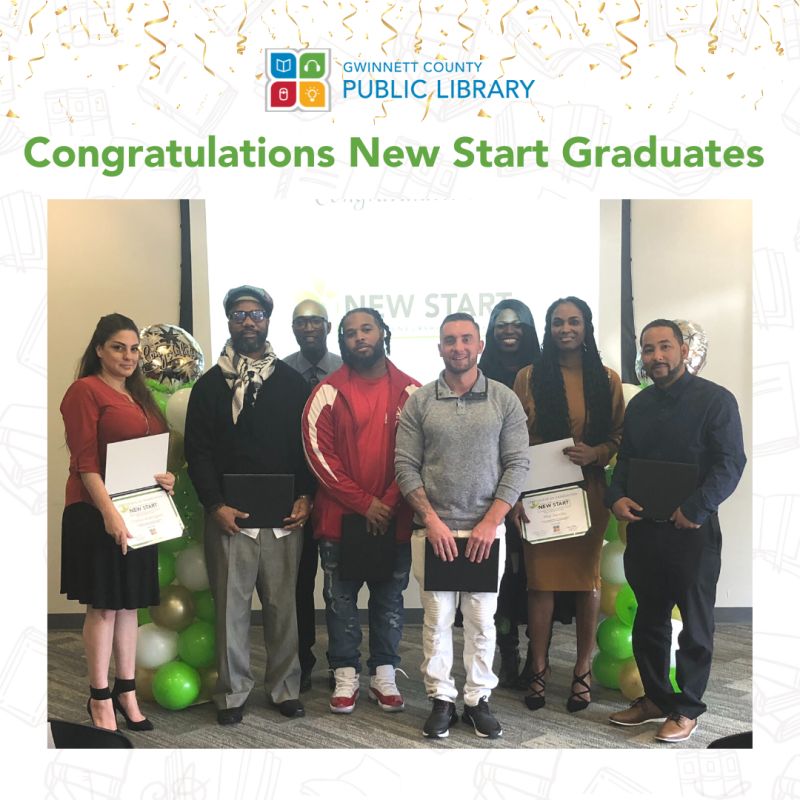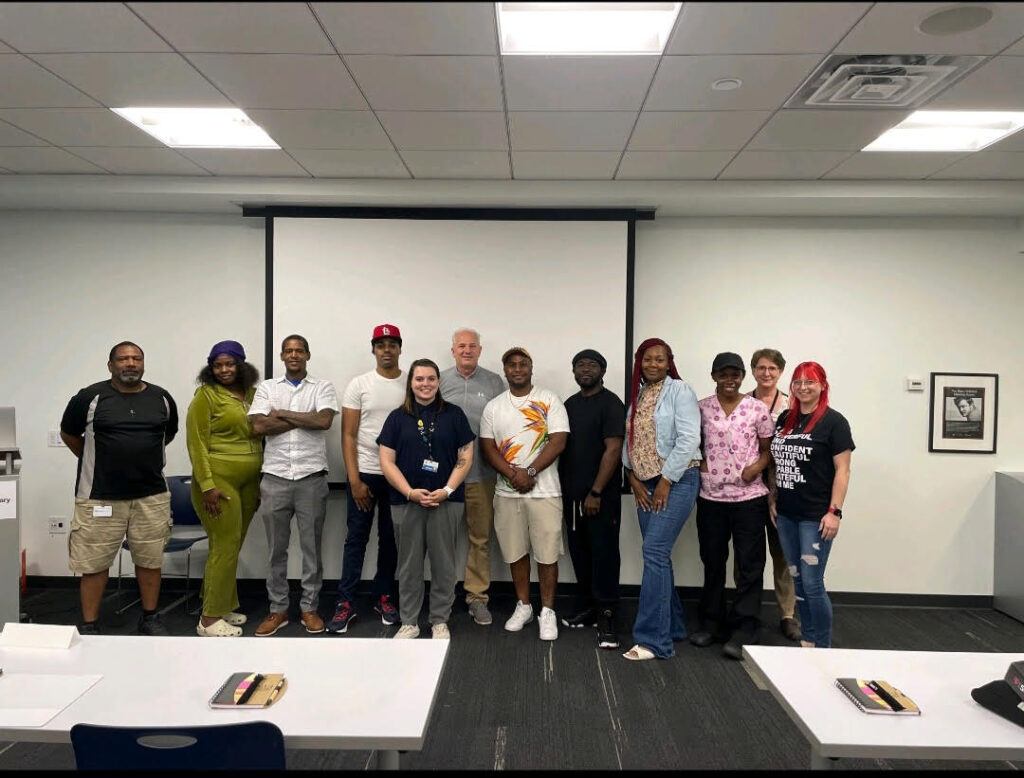
Two public libraries – Gwinnett County Public Library in Georgia and the St. Louis County Library in Missouri – have each started a small business entrepreneurship incubator created specifically for those who have been incarcerated.
Gwinnett County Public Library launched the first of these after being one of 13 libraries selected nationally in 2020 to be part of Libraries Build Business. Libraries Build Business is an initiative of the American Library Association that is supported by funding from Google.
The library received a $128,000 grant to start its program, known as the New Start Entrepreneurship Incubator.
“We’ve had three cohorts of this program,” says Adam Pitts, branch manager of the library system’s Lawrenceville Branch. “The first program was during covid. We started with seven participants. It was highly virtual, so it didn’t build the momentum we would have liked. There were three graduates. We had 23 in the second round, which was in-person and had 18 graduates and several success stories. The third cohort started in the summer of 2022. It began with 12 participants and ended with 10 graduates. We’re going to start accepting applications for the fourth cohort this fall and it will begin it in January 2024.”
The participants are chosen through an online application process and a virtual interview, as well as consideration of their business goals.
The program consists of monthly in-person classes on different topics, each led by a guest presenter. The topics include the mindset of being an entrepreneur and overcoming the barriers one might face, how to write a business plan, financial considerations, legal issues and branding.
In between the monthly classes, the students do a self-paced online curriculum designed by five library staff members. It combines resources available at the library and resources available online and incorporates elements from the Brian Hamilton Foundation’s Starter U.
Participants receive laptop and are paired with a mentor
Participants receive an entrepreneurship kit that consists of a laptop and a hot spot. If they complete the program and don’t miss more than one class, they get a laptop they can keep. They also receive a free book at each meeting that is related to the session’s topic. These include Nolo Press’s How to Write a Business Plan, The Power of Broke and Small Business for Dummies.
Each student is paired with a mentor who works in the type of business they want to start. Several of these mentors are recruited through SCORE and others are local business owners.
The program concludes with The Launchpad, a pitch competition that is judged by local business experts with winners receiving cash prizes. Before The Launchpad, participants attend a workshop that helps prepare them for public speaking and develop presentation skills.
In the end, “Everyone comes out with a business plan. We have a business plan workshop in addition to the monthly meetings. They have an opportunity to have their plans reviewed by experts. Only about one-third of the participants actually started a business,” says Pitts.
Those businesses include catering, cleaning, interior decorating, app design, online martial arts instruction and an assisted living facility.
What this small business entrepreneurship incubator means for the library
“The New Start Entrepreneurship Incubator has been a unique opportunity to bring library and community resources together to support a marginalized group, and to our knowledge, it is the first of its kind,” says Pitts. “Public libraries have provided outreach services to jails and prisons for years, but very little is being offered for those who have already served their time and want to learn how to start a small business.”
And the incubator also enriches the Georgia area where the library is located. “Our program answers a need that was lacking in our community, namely an entrepreneurship program that takes into consideration the many challenges and barriers faced by justice-impacted individuals,” he adds. “The New Start Entrepreneurship Incubator has not only had a profound impact on the lives of the participants but has also helped create jobs and support the local economy.”
Convinced of its benefit to both the library and Gwinnett County, Pitts is determined for New Start to continue. “We’ll be seeking additional grants to sustain the program,” he says.
St. Louis launches small business entrepreneurship incubator
In addition to inspiring Gwinnett County entrepreneurs to start their own businesses, Pitts also, unbeknownst to him, inspired Megan Phifer-Davis, the St. Louis County Library reference manager, to start a small business entrepreneurship incubator program similar to his.
She heard him at a conference in 2021 and thought an entrepreneurship program for formerly incarcerated individuals would be beneficial for the people her library system serves.
“We have a reference by mail service. A lot of those questions we have been getting were asking how to start a business or a nonprofit or what jobs are available to those with a record. I was hearing that they wanted to work for themselves, do something they’re passionate about and make their own schedule,” she says.

So, she teamed up with her colleague, a small business librarian, to create the SLCL Small Business Launchpad and funded it through a $3,500 technology access grant from the Missouri State Library.
The program just launched August 9. Through an application process, they chose 12 people. The cohort will meet in-person on the second and fourth Wednesday of the month for six months.
One session each month will be facilitated by Phifer-Davis and her colleague and the other by a guest speaker. “We partnered with organizations in the city that do work with small businesses. SCORE is doing a workshop on creating a business plan. In October we’ll talk about finances, and we have someone from Great Southern Bank coming in to talk about that,” says Phifer-Davis.
There’s also an online homework component that consists of watching videos on professional development from the library’s database, reading articles online from publications like the Harvard Business Review and Entrepreneur and creating a business plan using a SCORE template.
Participants get a Chromebook and books that include The $100 Startup, The Power of Broke and Small Business Finance for the Busy Entrepreneur.
There will be a pitch competition, and Phifer-Davis says they’re in the process of hashing out the details.
“We’re still working on the prizes. We have an application for a grant for $10,000 from the Rooblee Foundation. People who finish the program will get a certain amount of money. If they participate in the event they will get some money as well. If we get this grant every participant will walk away with something,” she says. “We should find out in November. If we don’t get it, I’ll have to figure something else out.”
Small Business Launchpad has broad impact
In the meantime, Phifer-Davis sees the impact of the Small Business Launchpad as a service in a broad sense rather than something that will benefit the library itself.
“It means that we’re going to help people achieve their dreams,” she says. “There’s no gain for the library. We’re going to help build our economy by getting small businesses up and running. Hopefully they will bring in jobs. It’s more for our patrons and for the community.”

